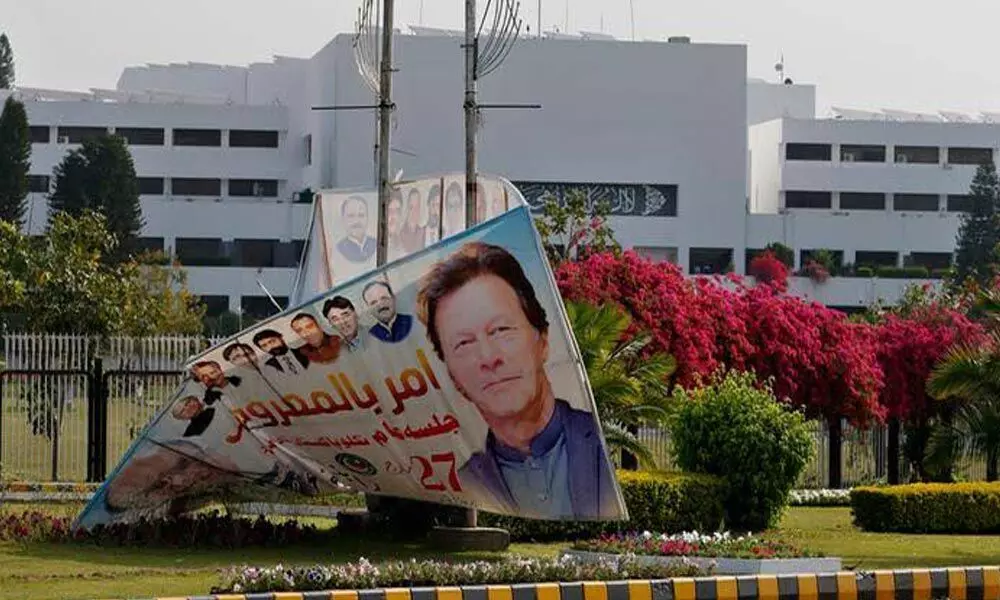Pakistan's political crisis can be a regional security crisis
Political power play exposes the existing deep fissures and the emerging ones between various parties
image for illustrative purpose

Added to the political uncertainty, if there is infighting within the Pakistan army, then there is also a real danger of Pakistan falling into the hands of Islamic fundamentalists
Pakistan's political crisis can become a regional security crisis with implications beyond its borders due to a possible split within Pakistan's army, overbearing Islamic fundamentalist, weak Opposition, and nuclear arsenals.
Last Sunday, the ongoing political turmoil in Pakistan witnessed an anti-climax when Prime Minister Imran Khan stunned the Opposition parties by recommending snap elections after he got Pakistan President Arif Alvi to dissolve the National Assembly to avoid the anti-trust vote moved against him by the Opposition.
Pakistan observers and local leaders were convinced that either Imran Khan would resign before the trust vote or lose it, but Khan decided to fight till the "last ball" in the ongoing civil-military tussle.
However, in his quest to remain in power, Imran Khan may have used the last lifeline of his political career when he blamed the US for conniving to overthrow his "democratically elected" government. This allegation" has the potential to damage the US and Pakistan relationship -especially between the Pakistan establishment and the current US administration. That explains why Pakistan Army Chief Qamar Javed General Bajwa had to step in and defend the US.
The political power play has exposed the existing deep fissures and the emerging ones, between various parties, including "the Pakistan establishment", that can prove detrimental and thus, should be of grave concern to India and the world in general.
Division with Pakistan Army
Aamir Liaquat Husain, who is a member of Imran Khan's, Pakistan Tehreek-e-Insaf, party and a member of the National assembly, accused Khan of creating "division in the army", "trying to pit a corps commander", and planning to "remove the current Army chief." If true, then Pakistan might be facing a more serious challenge than visible to the world. On the other hand, there might be some truth behind Husain's claim, given that former ISI chief, Lt Gen Hameez, who oversaw crucial changes in Afghanistan when the Taliban took control in August, was removed and appointed as the Peshawar Corps Commander. This abrupt change did not go down well with Imran Khan and led to a stan-off between General Bajwa and cricket-turned-politician.
Added to the political uncertainty, if there is infighting within the Pakistan army, then there is also a real danger of Pakistan falling into the hands of Islamic fundamentalists.
Nuclear worry
India and the world have a different worry - it is the safety of Pakistan's nuclear arsenal. Given its nuclear stockpile, a de-stable Pakistan is not in any onces interest, particularly in India and the region.
The uprising in Balochistan province and Khyber Pakhtunkhwa (KPK) province, including the former Federally Administered Tribal Areas (FATA), have stretched the Pak army. Thus, General Bajwa will do everything to avoid another crisis, especially from Islamic fundamentals and political instability -therefore the sacrifice of Khan. Though publicly, neither India nor the US has raised any concern about the safety of Islamabad's strategic weapons, it is safe to assume that both the leading democracies must keep a close watch on the security situations and political developments.
Geopolitical Battelground
When Imran Khan brandished an alleged "secret letter" as proof that a 'foreign power was targeting his government'; he probably did not know that his action would turn Pakistan into a new geopolitical battleground. Instead, his claim attracted comments from both China and Russia, who took the opportunity to take shots at the US.
China's Foreign Minister Wang Yi while asserting that his country will not allow 'camp confrontation' to be repeated in Asia, which was part of the Cold War mentality, said, "small and medium-sized countries shall not become tools or even victims of the great power game."
Similarly, Russia criticised the US for making "another attempt of shameless interference into the internal affairs of Pakistan and asserted that Prime Minister Imran Khan was paying the price for being disobedient to Washington and being punished for visiting Russia in February this year."
Pakistan's economic crisis has the potential to make it go down the Sri Lanka way. "Its GDP has lost "one-third of its value" since Imran khan took over, bringing it to 2012-13 levels. Islamabad's financial crisis will be further exacerbated as the International Monetary Fund has stalled the $6 billion bailout programme due to the political situation.
As the Pakistan army restarts, the musical chair with a new set of willing corroborates who are ready to dance to the military band of General Bajwa, the challenge for the new administrator would be to find a quick solution to multiple challenges the country faces, including the economic crisis.
However, the challenge is not who will be the head of the government -however, the question is how long before it too falls from grace and losses favour with Pakistani Generals. This political conundrum could be a watershed moment for Pakistan if the people grab this opportunity to hold political parties and the establishment accountable - but knowing the country that is deeply divided over ethnicity, tribes and the haves and have nots lines is too big an ask.
(The author is Founder, MyStartup TV)

